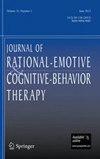REBT Supervision Practical: Focusing on Competence Enhancement and Assessing Competence
IF 1.4
4区 心理学
Q3 PSYCHOLOGY, CLINICAL
Journal of Rational-Emotive and Cognitive-Behavior Therapy
Pub Date : 2022-02-28
DOI:10.54382/krecbt.2.1.68
引用次数: 0
Abstract
The purpose of this study is to provide a theoretical basis and practical help for the implementation of domestic cognitive behavioral therapy supervision by reviewing the studies centered on competence enhancement and competency evaluation of supervisors, which are the core emphasis in the practice of cognitive behavioral therapy supervision. To this end, this study introduced the practice of capacity building and evaluation based on several studies that verified inter-rater reliability and validity of evaluation tools for cognitive behavioral therapy supervision. The conclusion is as follows. First, competency reinforcement used in cognitive behavioral therapy supervision is basically divided into basic competency and functional competency, and helps to perform high quality psychotherapy and supervision. Second, representative measurement tools for evaluating the competence of cognitive behavioral supervision are SAGE(Supervision: Adherence and Guidance Evaluation) and CTS-R(Revised Cognitive Therapy Scale). In the future, for domestic use of SAGE and CTS-R, additional processes such as understanding of evaluation tools, ethical aspects, evaluator training, and securing reliability are thought to be necessary. In addition, if continuous exploration and training are conducted for the development of domestic cognitive behavioral therapy research, it is believed that it will be of great practical help to the qualitative growth and development of supermarkets.REBT监管实践:注重能力提升与能力评估
本研究旨在通过对认知行为治疗监督实践中重点关注的主管能力提升和胜任力评价方面的研究进行梳理,为国内认知行为治疗监督的实施提供理论依据和实践帮助。为此,本研究在若干研究的基础上引入了能力建设和评估的实践,这些研究验证了评估工具在认知行为治疗监督中的信度和效度。结论如下。首先,认知行为治疗监督中的胜任力强化基本分为基本胜任力和功能胜任力,有助于开展高质量的心理治疗和监督。第二,评估认知行为监督能力的代表性测量工具是SAGE(supervision: compliance and Guidance Evaluation)和CTS-R(Revised cognitive Therapy Scale)。在未来,对于SAGE和CTS-R的国内使用,额外的过程,如对评估工具的理解、伦理方面、评估人员培训和确保可靠性被认为是必要的。此外,如果对国内认知行为治疗研究的发展进行不断的探索和培训,相信对超市的质的增长和发展将有很大的实际帮助。
本文章由计算机程序翻译,如有差异,请以英文原文为准。
求助全文
约1分钟内获得全文
求助全文
来源期刊

Journal of Rational-Emotive and Cognitive-Behavior Therapy
PSYCHOLOGY, CLINICAL-
CiteScore
3.50
自引率
18.80%
发文量
49
期刊介绍:
The Journal of Rational-Emotive and Cognitive Behavior Therapy is an international journal that publishes scholarly original papers concerning Rational Emotive Behavior Therapy (REBT), Cognitive Behavior Therapy (CBT), behavior therapy, cognitive-behavioral hypnosis, and hypnotherapy, clinical and counseling psychology, psychiatry, mental health counseling, and allied areas of science and practice. The journal encourages scholarly debate amongst professionals involved in practice, theory, research, and training in all areas of scholarship relevant to REBT and CBT. The Journal is particularly interested in articles that define clinical practice and research and theoretical articles that have direct clinical applications. The Journal seeks theoretical discussions and literature reviews on the cognitive bases of the development and alleviation of emotional, behavioral, interpersonal, personality, and addictive disorders. We consider submissions on the applications of REBT and CBT to new areas of practice and client populations. The Journal considers the term Cognitive Behavior Therapy to represent a generic, overriding category or school of psychotherapy approaches that includes many different theories and techniques. The journals encourages research that clearly identifies the specific hypothetical constructs and techniques being measured, tested, and discussed, and the comparison of the relative influence of different cognitive processes, constructs, and techniques on emotional and behavioral disturbance. The Journal provides a timely introduction to unexplored avenues on the cutting edge of REBT and CBT research, theory, and practice.The Journal publishes:discussions of the philosophical foundations of psychotherapiestheory-buildingtheoretical articlesoriginal outcome research articlesbrief research reportsoriginal research on the support of theoretical models development of scales to assess cognitive and affective constructsresearch reviewsclinical practice reviewsempirically-based case studiesdescriptions of innovative therapeutic techniques and proceduresadvances in clinical trainingliterature reviews book reviewsUnder the guidance of an expanded, international editorial board consisting of acknowledged leaders in the field, the journal disseminates current, valuable information to researchers and practitioners in psychology, psychotherapy, psychiatry, mental health counseling, social work, education, and related fields.Manuscripts usually are less than 35 pages, double-spaced, and using 11 or 12-point font. If the authors need more space to communicate their research or ideas, they should write to the editors to discuss this issue and provide a rationale why more than the commended number of pages is needed.
 求助内容:
求助内容: 应助结果提醒方式:
应助结果提醒方式:


